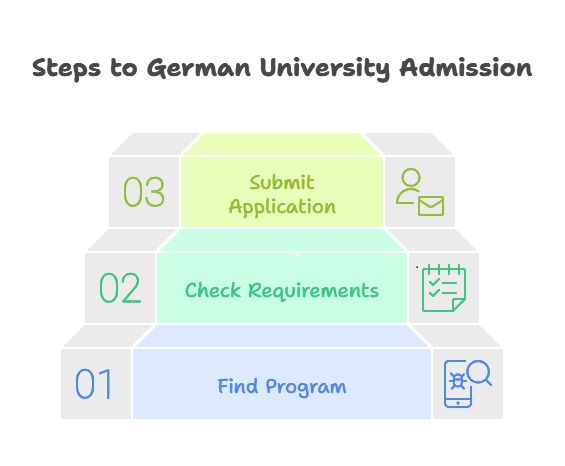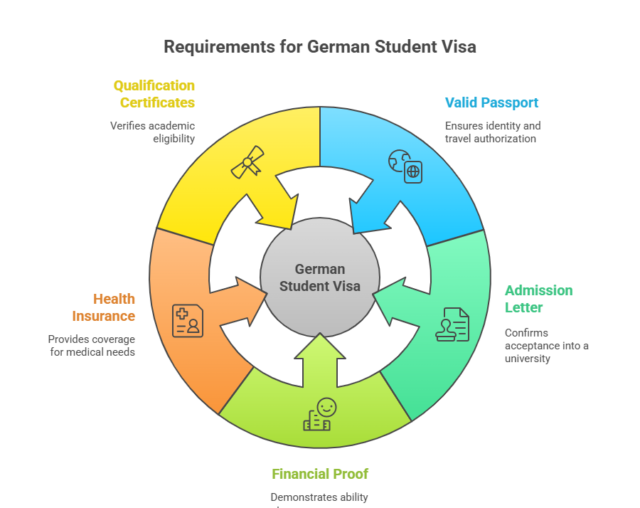Germany is known for its engineering marvels and economic strength. It is often called the “Land of Ideas.” For international students, it represents something more: a land of opportunity. A place where a world-class education is not a privilege, but an accessible reality. Each year, Germany attracts a massive global student population. According to the latest official statistics, there are now over 458,000 international students in the country, making it one of the most popular study destinations worldwide. This number continues to grow for a very simple reason. Germany offers a unique combination of academic excellence, unparalleled affordability, and outstanding career prospects.
This guide will provide a comprehensive look at what it means to study in Germany. We will explore the key reasons that answer the question, “Why study in Germany?“. We will cover everything from its unique education system and tuition-free model to the visa process and living costs. This article is your first step towards an incredible educational journey.
Top Reasons to Study in Germany
Many factors make Germany a top choice for students globally. The country has carefully built an environment that supports academic growth and future success.
1. World-Class, Tuition-Free Education
This is Germany’s most famous advantage. Most public universities in Germany offer tuition-free education to all students, including internationals. This is not a temporary offer; it is a core part of the German belief in accessible education. Instead of high tuition fees, students at tuition-free public universities pay only small semester fees. This fee, typically between €150 and €400 per semester, is a contribution that covers administration costs and often includes a public transport ticket for your city. This policy dramatically reduces the financial burden of higher education.
2. Strong Economy and Excellent Career Prospects
A degree from Germany opens doors to a powerful job market. Germany has the largest economy in Europe and boasts a very low unemployment rate, which stood at around 5.7% in early 2025. German universities work closely with industries, ensuring their programs are relevant and graduates are job-ready. After graduation, non-EU students can apply for an 18-month residence permit to find a job. This generous post-study work opportunity makes it a practical choice for long-term career goals.
3. A Global Hub of Research and Innovation
Germany is a world leader in research and development. The government and industries invest billions each year in R&D. Students have the chance to learn in state-of-the-art facilities and from leading academics. The country is home to renowned research institutions like the Max Planck Society and the Fraunhofer-Gesellschaft. This focus on innovation means your education will be at the forefront of your field.
4. High Quality of Life in the Heart of Europe
Germany is one of the safest and most stable countries in the world. It has excellent public infrastructure, reliable transportation, and a high standard of living. Its central location in Europe is also a major benefit. Students can easily and affordably travel to neighboring countries like France, Austria, and the Netherlands. This allows for an enriching cultural experience beyond your studies.
Navigating the Germany Education System for International Students
The Germany education system for international students is diverse and of a very high standard. It is important to understand the different types of institutions to find the right fit for your goals.
- Universities (Universitäten): These institutions are strongly research-oriented. They offer a wide range of subjects and are the only institutions that can award PhDs. They are ideal for students who are interested in theoretical knowledge and academic research.
- Universities of Applied Sciences (Fachhochschulen or HAWs): These institutions are focused on practical, hands-on learning. Their programs are tailored to the needs of the professional world and often include mandatory internships. They are an excellent choice for fields like engineering, business, and design.
- Colleges of Art, Film, and Music (Kunst-, Film- und Musikhochschulen): These colleges offer specialized education for students with artistic talents. They have specific admission requirements, often including an entrance exam or portfolio submission.
All these institutions follow the internationally recognized system of Bachelor’s, Master’s, and PhD degrees, making your German qualification easily understood by employers worldwide.
The Application Process for Studying in Germany
Preparing for German university admissions requires careful planning. The application process for studying in Germany can be broken down into a few key steps.
Step 1: Find a Program and Check Requirements
Your first step is to find the right course. The best resource is the German Academic Exchange Service (DAAD) database, which lists thousands of programs. Once you find a program, you must carefully check its specific admission requirements. This includes academic qualifications and language proficiency.
Step 2: Fulfill University Admission Requirements
You must have a “university entrance qualification” (Hochschulzugangsberechtigung or HZB). For many international students whose high school certificate is not recognized as equivalent to the German Abitur, this means attending a one-year preparatory course called a Studienkolleg. Successfully passing the final exam of the Studienkolleg grants you admission to universities in Germany.
Step 3: Submit Your Application
Submitting your application is the final and most critical stage of the application process for studying in Germany. The German system has two primary routes for submission: applying through the centralized Uni-assist portal, which serves many universities, or applying directly to the university’s own online portal. Navigating this can be a daunting task. Each university has its own specific requirements, and the documentation for Uni-assist must be prepared and certified with meticulous attention to detail. A small error or a missed deadline can jeopardize your entire application.
This is where expert guidance becomes invaluable in preparing for German university admissions. At Cliftons, we specialize in transforming this complex procedure into a simple, stress-free experience for you. We understand the specific nuances, document requirements, and deadlines for both Uni-assist and direct university applications.
Our experienced counselors manage your entire application submission from start to finish. We take on the responsibility of ensuring that all your documents are correctly compiled, certified, and submitted well before the crucial application deadlines. Whether your chosen universities require an application via Uni-assist or their own portals, Cliftons handles the entire procedure on your behalf. This eliminates the confusion and potential for critical errors, allowing you to focus on your academic and language preparations. Our goal is to present your profile in the most professional way possible, maximizing your chances of receiving an admission offer from your dream German university.
Understanding the Financials: Fees, Costs, and Scholarships
A key part of your plan to study in Germany is managing your finances. While education is often free, you still need to cover your living expenses.
Tuition Fees and Scholarship in Germany
As mentioned, most public universities are tuition-free. The main exception is the state of Baden-Württemberg, which charges non-EU students a fee of €1,500 per semester. Private universities also charge significant tuition fees. To support students, Germany offers many funding options. The most well-known are the DAAD scholarships and other German funding options. The DAAD is one of the world’s largest scholarship organizations and offers programs for students from various countries and academic levels.
Housing and Living Costs for Students in Germany
To get a student visa, you must prove you have sufficient funds to cover your living expenses. The German government currently requires proof of €11,208 per year, or €934 per month. This money is typically deposited into a special blocked account (Sperrkonto). The average cost of living for students in Germany varies by city. Major cities like Munich and Hamburg are more expensive than smaller cities like Leipzig or Bremen. Your biggest expense will be rent.
On-campus vs Off-campus Housing in Germany
Finding accommodation can be challenging, so you should start early.
- Student Halls of Residence: This is the cheapest option, with rent often between €250 and €400 per month. They are run by the local Studentenwerk (student services organization). However, there are long waiting lists, so you must apply months in advance.
- Private Accommodation: This is the most common option. Many students live in shared flats, known as Wohngemeinschaften or WGs. This is a great way to meet new people and practice your German.
Essential Requirements: Language and Visas
Meeting the language and visa requirements is a critical part of your journey.
Language Requirements to Study in Germany
The language requirements to study in Germany depend on your chosen program.
- German-Taught Programs: If your course is in German, you must prove your proficiency. This is usually done through a recognized test like the TestDaF or DSH. Many students take language courses in Germany to reach the required level.
- English-Taught Programs: Germany offers a growing number of programs taught entirely in English, especially at the Master’s level. For these, you will need to provide proof of English proficiency, such as a TOEFL or IELTS score. This makes the German vs English-language program requirements an important factor in your decision.
The Germany Student Visa Process
Students from outside the EU will need a visa to study in Germany. The Germany student visa process must be started well in advance at the German embassy or consulate in your home country. You cannot enter Germany on a tourist visa and then apply for a student visa.
Key German student visa requirements & documentation include:
- A valid passport.
- The letter of admission from your university.
- Proof of financial resources (the blocked account confirmation).
- Proof of health insurance.
- University entrance qualification certificates.
Conclusion
The answer to “Why is Germany the best place to study?” is clear. It offers a unique and powerful combination of world-class, tuition-free education, a strong economy with excellent career prospects, and a high quality of life. The path to studying in Germany requires diligent research and careful preparation, from the application process to securing your visa. However, the rewards are immense. A German degree provides you with outstanding knowledge, practical skills, and a global perspective that will be an asset for your entire life. For any ambitious international student, Germany is not just a country to study in; it is a place to build a future.
Frequently Asked Questions (FAQs)
Why is Germany a good place to study?
Germany is an excellent place to study because it offers tuition-free education at most public universities, a high standard of teaching and research, a strong economy with great job opportunities after graduation, and a safe, welcoming environment for international students.
Can I study in Germany for free?
Yes, you can study for free at most public universities in Germany. You do not have to pay tuition fees. However, you are required to pay a semester contribution fee, which is usually between €150 and €400. This fee covers administrative costs and often includes a public transport ticket.
Do I need to speak German to study in Germany?
Not necessarily. While many programs are taught in German, there are over 2,000 programs, especially at the Master’s level, that are taught entirely in English. If you apply for an English-taught program, you will need to prove your English proficiency with a test like IELTS or TOEFL.
How much money do I need to show for a German student visa?
For your student visa application, you must prove that you have enough money to cover your living expenses for one year. The current official amount required by the German government is €11,208. This is typically done by depositing the amount into a blocked account (Sperrkonto).







